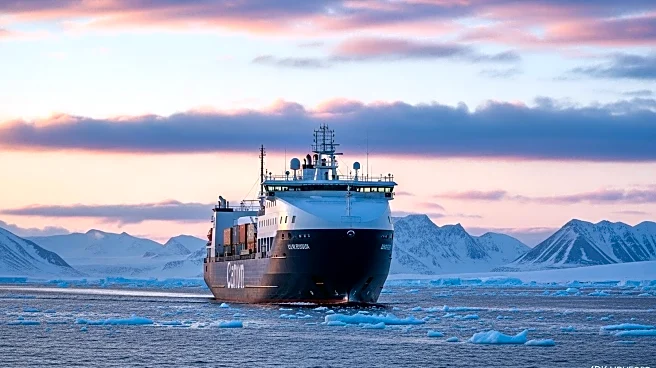What's Happening?
A Chinese container ship, operated by Sea Legend Container Line, has successfully completed its maiden voyage through the Arctic, docking at Felixstowe, the UK's largest container port. This pioneering journey significantly reduced the transit time for electric vehicles and solar panels destined for Europe, cutting it in half compared to traditional routes like the Suez Canal or Cape of Good Hope. The voyage was delayed by two days due to a storm off Norway's coast but still reached Europe faster than expected. The Northern Sea Route, made viable by global warming, runs through Arctic waters within Russia's exclusive Economic Zone, offering a new shipping path. This development is part of China's strategy to enhance maritime links with Europe amid ongoing trade disputes with the United States.
Why It's Important?
The successful Arctic voyage by the Chinese freighter marks a significant shift in global shipping logistics, potentially altering trade dynamics between major economies. By reducing delivery times, China can strengthen its trade relations with Europe, the world's third-largest economy, while diversifying its export markets. This is crucial as China faces a costly trade dispute with the United States, the largest consumer market. The new route also highlights the impact of climate change, with the Arctic warming four times faster than the global average, leading to decreased sea ice and new shipping opportunities. This could have long-term implications for global trade routes and environmental policies.
What's Next?
The Istanbul Bridge, carrying approximately 4,000 containers, is scheduled to continue its journey to Germany, Poland, and the Netherlands. As China and Russia collaborate to develop this Arctic shipping route, other nations may explore similar opportunities, potentially reshaping global trade routes. The unpredictability of Arctic weather and sailing conditions remains a challenge, but successful voyages like this could encourage more shipping companies to consider the Northern Sea Route. Stakeholders in the shipping industry, environmental groups, and policymakers will likely monitor these developments closely.
Beyond the Headlines
The opening of the Northern Sea Route raises ethical and environmental concerns. While it offers economic benefits, the increased shipping traffic could impact the fragile Arctic ecosystem. The collaboration between China and Russia also reflects geopolitical shifts, as nations seek to leverage new trade routes for strategic advantages. Long-term, this could influence international relations and environmental policies, as countries balance economic growth with sustainability.










